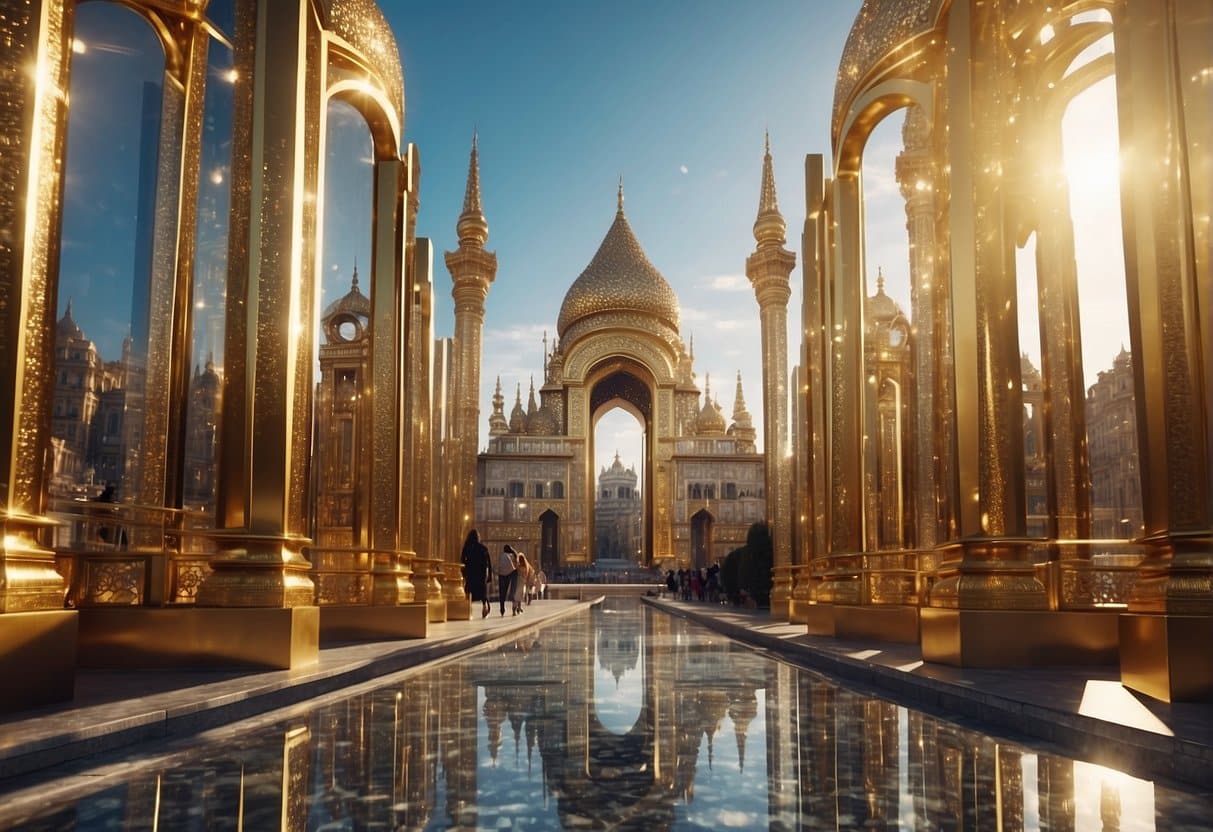Heaven is a concept that has fascinated people for centuries. It is often depicted as a place of eternal bliss and happiness, where people go after they die.
But how old is heaven? Is it a timeless place that has always existed, or was it created at some point in the past?
Today, I will research the age of heaven and what different religious texts have to say about it.

According to the Bible, heaven is eternal and has no beginning or end. It is the dwelling place of God and is often described as a place of perfect peace and joy. However, the Bible is less clear about the age of heaven.
While it does not give a specific age, it does suggest that heaven has always existed. In contrast, the “heavens,” which refer to the physical universe, are believed to have a definite origin.
Different religious traditions have different views on the age of heaven. Some believe that it was created at the same time as the universe, while others believe that it has always existed.
The Age Of Heaven: Biblical Foundations

When it comes to the age of Heaven, the Bible provides some foundational information that can help us understand this concept better. Here are some key subsections to consider:
Genesis and the Creation Narrative
The book of Genesis in the Old Testament provides the creation narrative, which tells us that God created the heavens and the earth in six days (Genesis 1:1-31).
While the age of heaven is not explicitly stated in this passage, it does give us a starting point for understanding the timeline of creation.
Revelation and the Promise of a New Heaven
In the New Testament book of Revelation, we find a promise of a new heaven and a new earth (Revelation 21:1). This passage indicates that the current heaven and earth will pass away, and a new one will be created.
While this passage does not give us a specific age for the current heaven, it does suggest that it will not last forever.
How Old is Heaven: Theological Perspectives
When it comes to the concept of how old heaven is, theological perspectives play a crucial role. Christianity teaches that heaven is eternal and that it is a place where believers will spend their eternal life.
The concept of eternity in Christianity is often linked to the Kingdom of God, which is described as an eternal kingdom that will never end.
Concept of Eternity in Christianity
Theologians have debated the concept of eternity in Christianity for centuries. The Bible teaches that eternal life is a gift from God and that it is only through faith in Jesus Christ that believers can receive this gift.
The concept of eternity is closely linked to the idea of resurrection, which is a central belief in Christianity.
Interpretations of Afterlife
There are different interpretations of the afterlife in Christianity, but the general belief is that believers will spend their eternal life in heaven.
Theologians have debated the nature of the afterlife, and there are different opinions on the nature of the soul and the resurrection of the body.
In summary, the concept of how old heaven is has been debated by theologians for centuries. Christianity teaches that heaven is eternal and that it is a place where believers will spend their eternal life.
The concept of eternity in Christianity is closely linked to the Kingdom of God, which is described as an eternal kingdom that will never end.
Theologians have debated the concept of eternity and the afterlife, but the general belief is that believers will spend their eternal life in heaven.
Heaven in Different Religions

Heaven is a concept that is present in many religions and cultures around the world.
Different religions have different views on what heaven is, how it can be attained, and what happens there.
Hebrew Views of the Afterlife
In Hebrew tradition, the afterlife is not a major focus. Instead, the focus is on living a good life in the present. The Hebrews believed in Sheol, which was a place of darkness and silence where all the dead went.
There was no distinction between the righteous and the wicked, and there was no reward or punishment in Sheol.
The concept of heaven as a place of reward for the righteous was not developed until later in Jewish history.
Islam and the Concept of Paradise
In Islam, the concept of paradise is known as Jannah. The Quran describes Jannah as a place of gardens, rivers, and beautiful mansions. It is a place of eternal bliss and happiness for those who have lived a righteous life.
The Hadiths, which are the sayings of the Prophet Muhammad, provide more detailed descriptions of what paradise is like. In Jannah, there are beautiful women, delicious food, and flowing wine.
The faithful are also promised eternal youth and good health.
Symbolism and Representation
Heaven has been represented in various ways throughout history, with different symbols and metaphors used to describe it.
In this section, we will explore some of the most common heavenly imagery found in scripture.
Heavenly Imagery in Scripture
The Bible uses a variety of symbols and imagery to represent heaven.
For instance, heaven is often described as the dwelling place of God. Psalm 33:13-14, says, “The Lord looks down from heaven; he sees all the children of man; from where he sits enthroned he looks out on all the inhabitants of the earth.”
This imagery suggests that heaven is a place of power and authority, where God reigns supreme.
Another common symbol used to represent heaven is light. In 1 John 1:5, it says, “God is light, and in him is no darkness at all.”
This suggests that heaven is a place of purity and perfection, where there is no sin or evil.
Metaphors for the Divine Dwelling
In addition to symbols, the Bible also uses metaphors to describe heaven. One of the most common metaphors is that of a city. In Hebrews 11:16, it says, “But as it is, they desire a better country, that is, a heavenly one. Therefore God is not ashamed to be called their God, for he has prepared for them a city.”
This metaphor signifies that heaven is a place of community and fellowship, where believers can come together and worship God.
Another common metaphor used to describe heaven is that of a garden. In Song of Solomon 4:12-13, it says, “A garden locked is my sister, my bride, a spring locked, a fountain sealed.
Your shoots are an orchard of pomegranates with all choicest fruits, henna with nard.” This metaphor suggests that heaven is a place of beauty and abundance, where believers can enjoy the pleasures of life without the pain and suffering of this world.
In summary, heaven is represented in many different ways in scripture, with symbols and metaphors used to convey its beauty, power, and perfection.
Whether it is described as a city or a garden, a place of light, or a dwelling place of God, the imagery used to represent heaven reminds us of its majesty and glory.
Contemporary Understanding
When it comes to the age of Heaven, contemporary understanding is mixed. While some believe that Heaven is a real place that exists outside of time and space, others see it as a cultural and philosophical concept that has evolved.
Scientific and Philosophical Inquiry
From a scientific and philosophical perspective, the age of Heaven is difficult to determine. Some argue that since Heaven exists outside of time and space, it cannot be measured in conventional terms.
Others believe that the age of Heaven is tied to the age of the cosmos, as it is believed that the creator of the universe is also the creator of Heaven.
Cultural Depictions of Heaven
Culturally, how old is Heaven has been depicted in a variety of ways.
In many religions, Heaven is seen as a place of eternal youth and beauty, where the inhabitants are free from the limitations of earthly life. This depiction of Heaven suggests that it is a place that is timeless and unchanging.
